
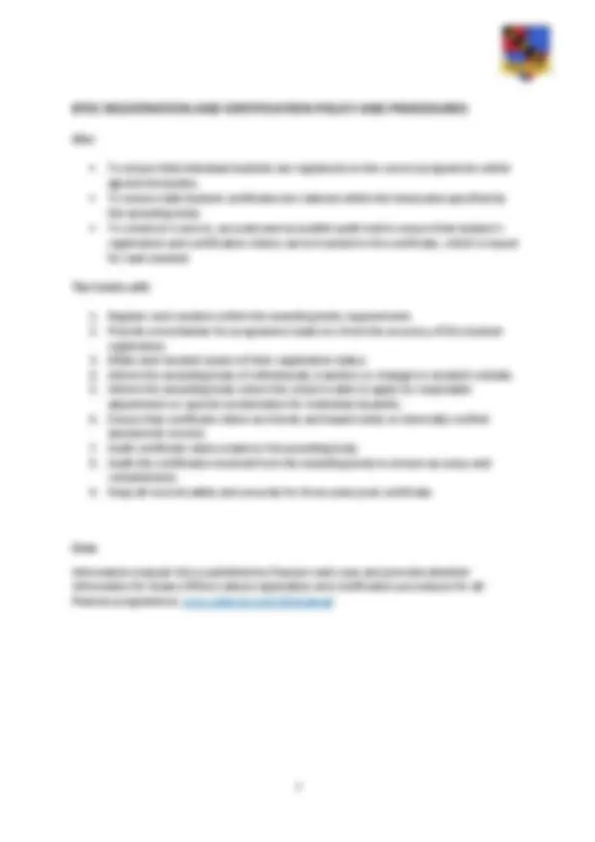
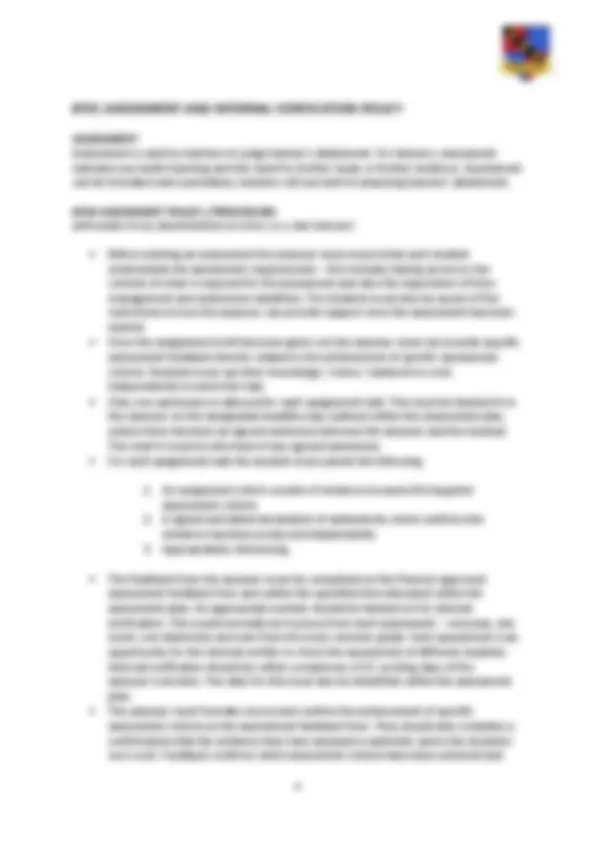
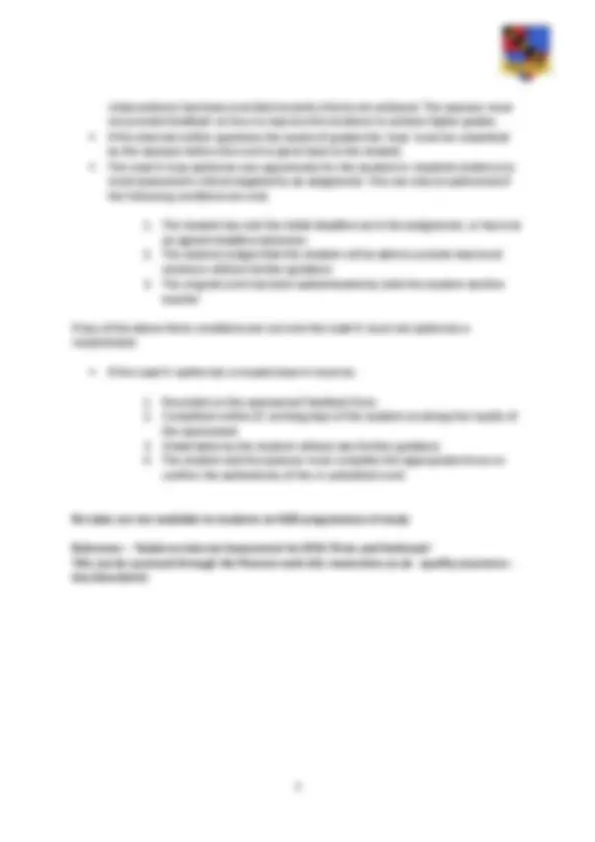
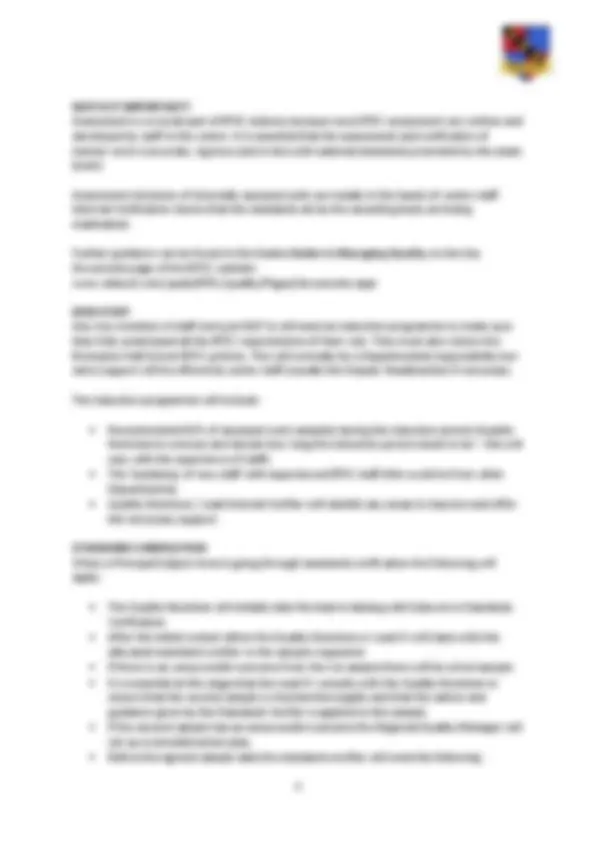
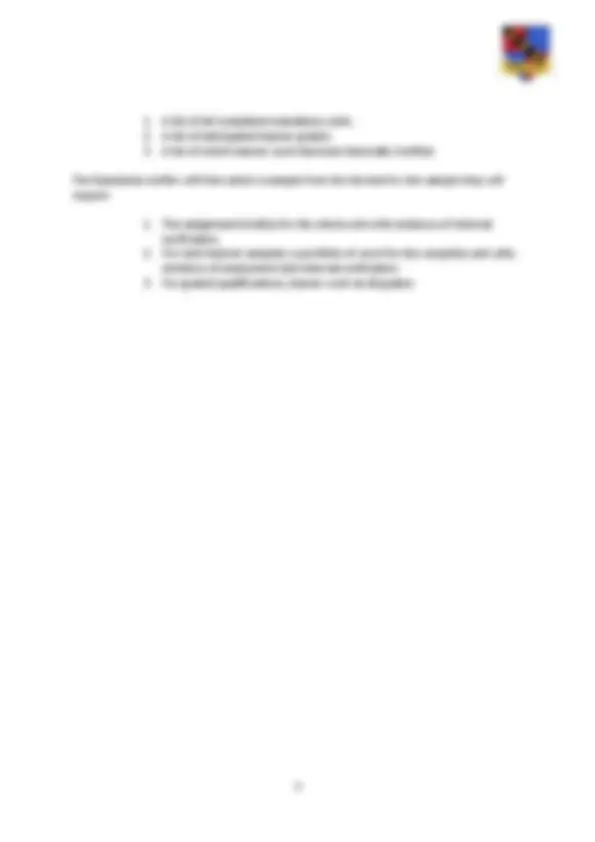
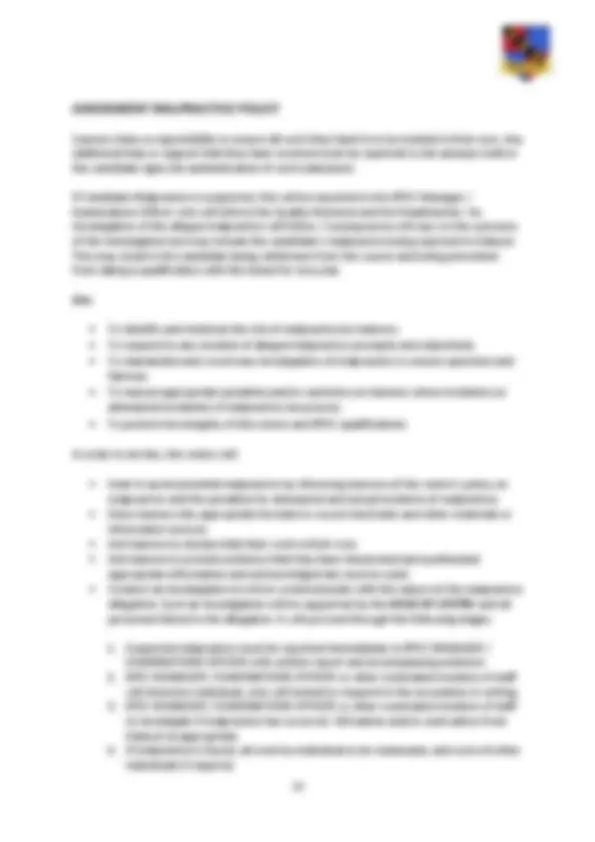
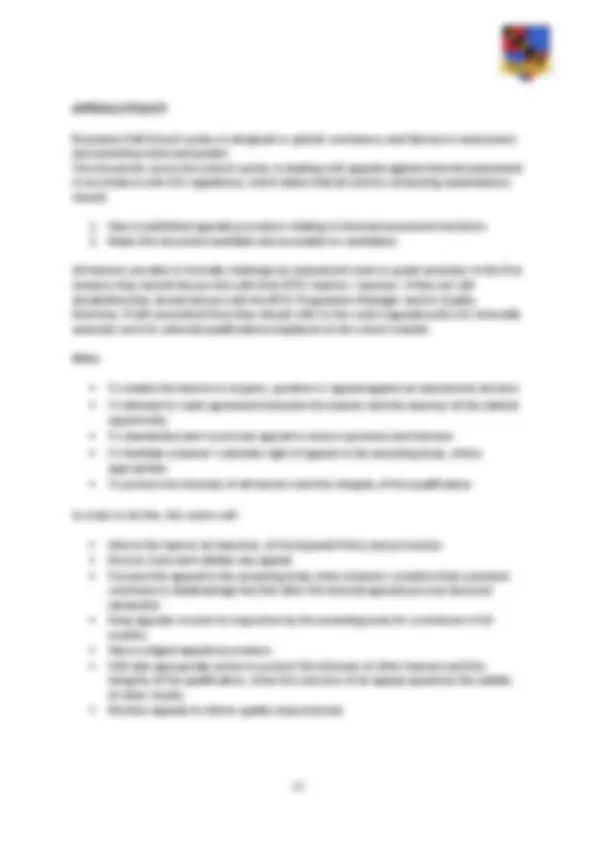
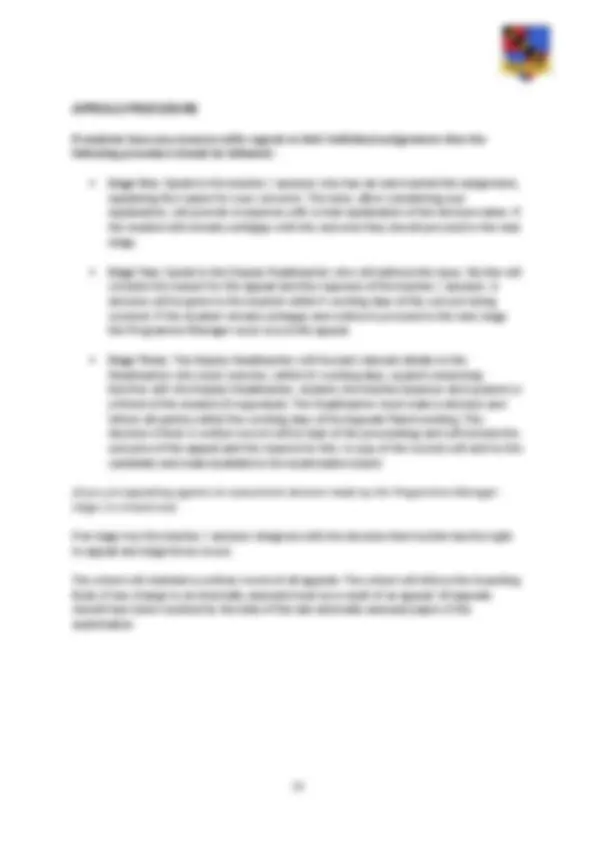
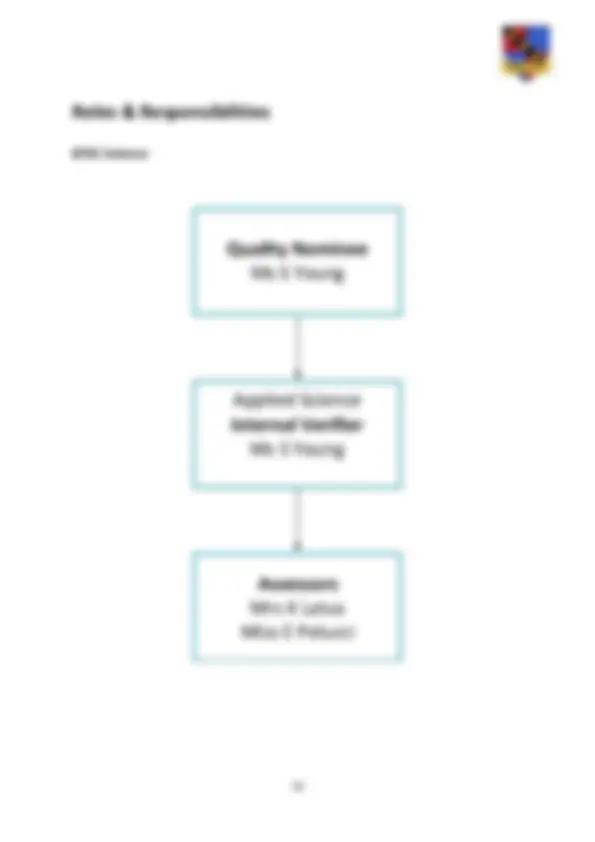
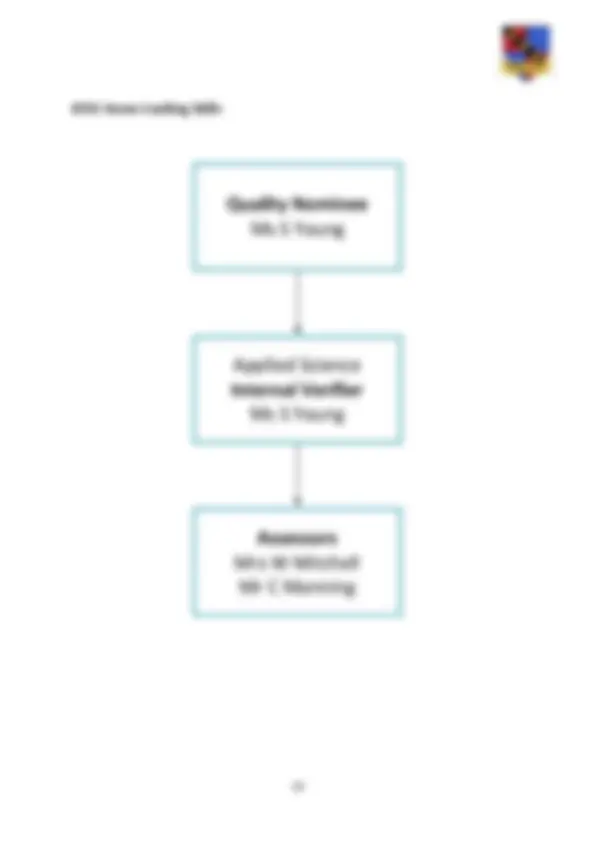


Study with the several resources on Docsity

Earn points by helping other students or get them with a premium plan


Prepare for your exams
Study with the several resources on Docsity

Earn points to download
Earn points by helping other students or get them with a premium plan
Community
Ask the community for help and clear up your study doubts
Discover the best universities in your country according to Docsity users
Free resources
Download our free guides on studying techniques, anxiety management strategies, and thesis advice from Docsity tutors
Guidelines for assessment and feedback in BTEC programmes, including the importance of understanding assessment requirements, the role of formative and summative assessment, the use of Pearson approved assessment feedback forms, and the process for re-submitting work. It also covers the assessment of different units, the role of internal verification, and the consequences of malpractice.
Typology: Exams
1 / 18

This page cannot be seen from the preview
Don't miss anything!











Policy Page No. Registration and Certification Policy and Procedures 3 Assessment and Internal Verification Policy 4 Assessment Malpractice Policy 10 Appeals Policy 13 Appeals Procedure 14 Roles & Responsibilities BTEC Science 15 BTEC Sport 16 BTEC Travel & Tourism 17 BTEC Home Cooking Skills 18
Assessment is used by teachers to judge learner’s attainment. For learners, assessment indicates successful learning and the need for further study or further evidence. Assessment can be formative and summative; teachers will use both in assessing learners’ attainment. NEW ASSESSMENT POLICY / PROCEDURE (APPLICABLE TO ALL REGISTRATIONS AT LEVEL 2 & 3, NQF AND QCF) Before starting an assessment the assessor must ensure that each student understands the assessment requirements – this includes having access to the content of what is required for the assessment and also the importance of time management and submission deadlines. The students must also be aware of the restrictions in how the assessor can provide support once the assessment has been started. Once the assignment brief has been given out the assessor must not provide specific assessment feedback directly related to the achievement of specific assessment criteria. Students must use their knowledge / notes / textbook to work independently towards the task. Only one submission is allowed for each assignment task. This must be handed in to the assessor on the designated deadline day outlined within the assessment plan, unless there has been an agreed extension between the assessor and the student. The Lead IV must be informed of any agreed extensions. For each assignment task the student must submit the following:
what evidence has been provided towards criteria not achieved. The assessor must not provide feedback on how to improve the evidence to achieve higher grades. If the internal verifier questions the award of grades the ‘loop’ must be completed by the assessor before the work is given back to the student. The Lead IV may authorise one opportunity for the student to resubmit evidence to meet assessment criteria targeted by an assignment. This can only be authorised if the following conditions are met:
Teachers must keep records of learners and their assessed work. Teacher records must be monitored and sampled by the Lead Internal Verifier and Programme Manager. Learner assessments and verification records must be stored securely by the Programme Manager until all the final grades have been submitted; certification has been received by the school and handed out to the learners. In the event of an appeal against a grade then the evidence of the assessments should be kept until the appeal has been concluded. Learner grades must be kept in a secure location for three years after certification. WEAKNESSES IN ASSESSMENT Where there is an identified weakness in the assessment process the following will happen: Quality Nominee / Lead Internal Verifier’s will initially offer support and guidance. This will include setting actions as per Edexcel / school documentation and making sure the actions are followed up. If necessary the Quality Nominee and senior staff will become part of the support and guidance process. INTERNAL VERIFICATION Internal verification is a requirement of BTEC delivery. It is carried out on two levels in subject areas:
Assessment is a crucial part of BTEC delivery because most BTEC assessment are written and developed by staff in the centre. It is essential that the assessment and verification of learner work is accurate, rigorous and in line with national standards promoted by the exam board. Assessment decisions of internally assessed units are totally in the hands of centre staff. Internal Verification checks that the standards set by the awarding body are being maintained. Further guidance can be found in the Centre Guide to Managing Quality on the Key Documents page of the BTEC website: www.edexcel.com/quals/BTEC/quality/Pages/documents.aspx NEW STAFF Any new member of staff (not just NQT’s) will need an induction programme to make sure they fully understand all the BTEC requirements of their role. They must also review the Brompton Hall School BTEC policies. This will normally be a Departmental responsibility but extra support will be offered by senior staff (usually the Deputy Headteacher) if necessary. The induction programme will include: Recommended 50% of assessed work sampled during the induction period (Quality Nominee to oversee and decide how long the induction period needs to be – this will vary with the experience of staff). The ‘buddying’ of new staff with experienced BTEC staff (this could be from other Departments). Quality Nominee / Lead Internal Verifier will identify any areas to improve and offer the necessary support. STANDARDS VERIFICATION When a Principal Subject Area is going through standards verification the following will apply: The Quality Nominee will initially take the lead in liaising with Edexcel re Standards Verification. After the initial contact either the Quality Nominee or Lead IV will liaise with the allocated standards verifier re the sample requested. If there is an unsuccessful outcome from the 1st sample there will be a 2nd sample. It is essential at this stage that the Lead IV consults with the Quality Nominee to ensure that the second sample is checked thoroughly and that the advice and guidance given by the Standards Verifier is applied to this sample. If the second sample has an unsuccessful outcome the Regional Quality Manager will set up a remedial action plan. Before the agreed sample date the standards verifier will need the following:
Learners have a responsibility to ensure all work they hand in to be marked is their own. Any additional help or support that they have received must be reported to the assessor before the candidate signs the authentication of work statement. If Candidate Malpractice is suspected, this will be reported to the BTEC Manager / Examinations Officer who will inform the Quality Nominee and the Headteacher. An investigation of the alleged malpractice will follow. Consequences will vary on the outcome of the investigation but may include the candidate’s malpractice being reported to Edexcel. This may result in the candidate being withdrawn from the course and being prevented from taking a qualification with this board for one year. Aim To identify and minimise the risk of malpractice by learners. To respond to any incident of alleged malpractice promptly and objectively. To standardise and record any investigation of malpractice to ensure openness and fairness. To impose appropriate penalties and/or sanctions on learners where incidents (or attempted incidents) of malpractice are proven. To protect the integrity of this centre and BTEC qualifications. In order to do this, the centre will: Seek to avoid potential malpractice by informing learners of the centre’s policy on malpractice and the penalties for attempted and actual incidents of malpractice. Show learners the appropriate formats to record cited texts and other materials or information sources. Ask learners to declare that their work is their own. Ask learners to provide evidence that they have interpreted and synthesised appropriate information and acknowledged any sources used. Conduct an investigation in a form commensurate with the nature of the malpractice allegation. Such an investigation will be supported by the HEAD OF CENTRE and all personnel linked to the allegation. It will proceed through the following stages:
In cases of alleged/suspected Malpractice, the following will be done: Make the individual fully aware at the earliest opportunity of the nature of the alleged malpractice and of the possible consequences should malpractice be proven. Give the individual the opportunity to respond to the allegations made. Inform the individual of the avenues for appealing against any judgment made. Document all stages of any investigation. Where malpractice is proven, Brompton Hall School will apply the following penalties / sanctions:
Brompton Hall School’s policy is designed to uphold consistency and fairness in assessment and awarding marks and grades. This document covers the school’s policy in dealing with appeals against internal assessment in accordance with JCQ regulations, which states that all centres conducting examinations should:
If students have any concerns with regards to their individual assignments then the following procedure should be followed: Stage One. Speak to the teacher / assessor who has set and marked the assignment, explaining the reason for your concerns. The tutor, after considering your explanation, will provide a response with a clear explanation of the decision taken. If the student still remains unhappy with the outcome they should proceed to the next stage. Stage Two. Speak to the Deputy Headteacher who will address the issue. He/she will consider the reason for the appeal and the response of the teacher / assessor. A decision will be given to the student within 5 working days of the concern being received. If the student remains unhappy and wishes to proceed to the next stage the Programme Manager must record the appeal. Stage Three. The Deputy Headteacher will forward relevant details to the Headteacher who must convene, within 10 working days, a panel comprising him/her self, the Deputy Headteacher, student, the teacher/assessor and a parent or a friend of the student (if requested). The Headteacher must make a decision and inform all parties within five working days of the Appeals Panel meeting. This decision is final. A written record will be kept of the proceedings and will include the outcome of the appeal and the reasons for this. A copy of the records will sent to the candidate and made available to the examination board. (If you are appealing against an assessment decision made by the Programme Manager stage 2 is missed out) If at stage two the teacher / assessor disagrees with the decision then he/she has the right to appeal and stage three occurs The school will maintain a written record of all appeals. The school will inform the Awarding Body of any change to an internally assessed mark as a result of an appeal. All appeals should have been resolved by the date of the last externally assessed paper of the examination.
Quality Nominee Ms S Young Applied Science Internal Verifier Ms S Young Assessors Mr S Dale Mr D Bird
Quality Nominee Ms S Young Applied Science Internal Verifier Ms S Young Assessors Mrs B Harrison Mr K Moore